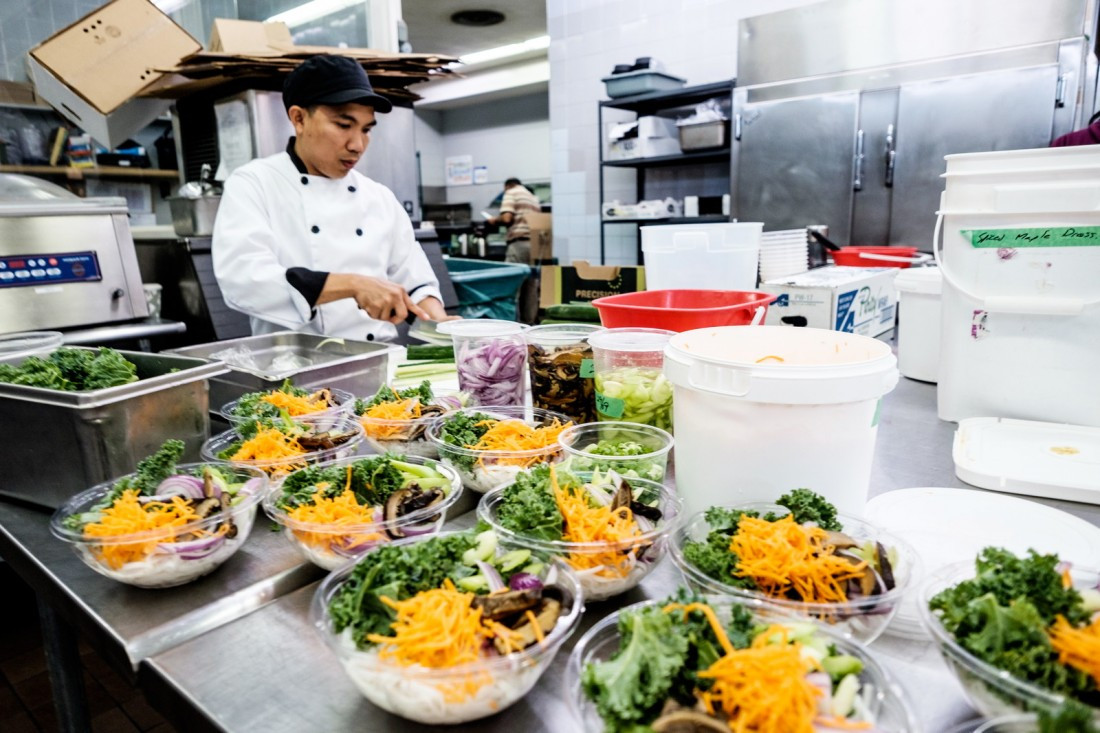Food fight?
Employee turnovers leave Diversity Foods without an executive chef
For six years, Diversity Food Services Inc. at the University of Winnipeg (U of W) led a surge in sustainable food practices at universities across Canada.
But in the last three months, the campus catering company tossed two executive chefs, leaving its future uncertain at the beginning of another busy school year.
Ben Kramer, who led kitchen operations as executive chef since 2009, left in July after his contract renegotiations with Diversity’s volunteer board of directors hit a stalemate.
Kramer said he’s sad to leave the project he called “his baby,” but insisted there’s no bad blood between him and Diversity.
“It wasn’t my decision to leave, but definitely my contract got tossed up in the air with some changes that I wasn’t comfortable with,” Kramer said. “I enjoyed my time here and I’m sad to leave it, but you know, that’s the way things go sometimes.”
For the next two years, Kramer has first right of refusal on the catering contracts he acquired while at Diversity, including Table for 1,200 and the Winnipeg Folk Festival’s volunteer kitchen, La Cuisine.
Kramer said he will continue to help Diversity on a freelance basis during large events, while working other private caterings and enjoying some free time in the coming months.
On Sept. 25, the man meant to replace Kramer, Estuardo Toledo, was fired after working at Diversity for about two months.
Ian Vickers, Diversity’s chief operating officer, confirmed Toledo’s departure in a statement emailed to The Uniter.
“Our strong network of community partners, reliable employees and experienced managers will continue to ensure that all food services for: students, faculty and staff, catered events, and the Buffalo Stone Café will be maintained at the same high standard,” Vickers said in the email from Sept. 28.
Diversity Foods caters to three U of W locations - Pangea’s Kitchen (Riddell Hall), Malecon (Centennial Buffeteria) and Elements Restaurant (Richardson College for the Environment and Science Complex) – and to FortWhyte Alive’s Buffalo Stone Café.
Between September and November, it serves an estimated 1,200 to 1,500 people per day between the four locales, Vickers said.
The Uniter did a joint interview with Toledo and Vickers about what the new executive chef would bring to the table three days before Toledo left.
“You come into Diversity and everyone who walks into that door – there is hope, there is a future we’re trying to impact,” Toledo said before his departure. “Bringing hope is one of the things that attracted me about working for Diversity. We don’t work for the capital… (it’s) a different opportunity for development and totally a different future.”
Toledo previously worked in the culinary departments at Red River College and the Southern Alberta Institute of Technology in Calgary, and as a teacher and vice-principal in School District 43 in Coquitlam, B.C. He is also an ordained minister, who fled to Canada as a refugee from Guatemala when he was 17.
Vickers touted Toledo’s culinary and organizational experience in the days before his firing.
“We interviewed a lot of candidates, but ultimately realized that Estuardo really has a viewpoint which is really consistent with the Diversity image and consistent with where Diversity needs to go,” Vickers said in the interview with Toledo.
Diversity’s volunteer board of directors – a group with five members from two Winnipeg non-profits, the University of Winnipeg Community Renewal Corporation (UWCRC) and SEED Winnipeg – is head hunting again.
Kramer said the executive chef position was fulfilling and afforded him a lot of influence on food policy at the provincial level.
“The exposure we managed to get and the ability to showcase that it’s not impossible to do healthy food, it’s not impossible to do local food, cooking from scratch on this kind of scale. I think we brought a lot of national attention to that,” he said.
“When we started six years ago, we were told by everybody that we would fail and that it wouldn’t work. And six years later, Ryerson (University) is now doing it, University of Victoria’s now doing it. I think we were kind of the catalyst for a lot of that stuff. That’s probably what I’m most proud of.”
Published in Volume 70, Number 4 of The Uniter (October 1, 2015)








